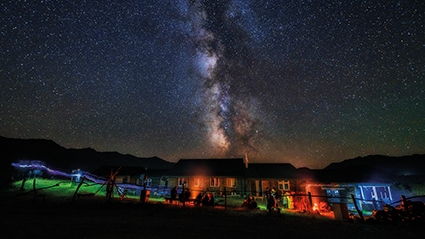AqTushetii: Fighting Rural-Urban Migration
One of the most challenging aspects of Georgia’s economic development is fighting rural-urban migration.
A lack of infrastructure and employment opportunities are some of the major barriers to developing rural areas; sending smart, ambitious, young people running to the city. Even in places with enormous potential to grow a tourism-focused economy, the lack of tourist infrastructure – hotels, cafes, restaurants, souvenir shops, transportation links, multilingual museums – stunts growth.
In one of Georgia’s most remote and most beautiful corners, the region of Tusheti, in the northeast of the country, a small group of international artist-entrepreneurs have developed a new concept. The artist collective AqTushetii is breathing new life into the mountainous rural area, accessible by car only half the year. GEORGIA TODAY spoke with the founders to learn more about their project, and what it is doing for the communities of Tusheti.
What exactly is AqTushetii?
AqTushetii is a residency program and festival that fosters the arts, culture, history, and traditions of Tusheti while bringing together people from around the world to collaborate, create, and share knowledge.
The name AqTushetii is an expression that roughly translates to “here is Tusheti,” which locals use as something along the lines of let’s make the best with what we’ve got on hand when faced with shortages of resources or other hardships.
Who is the AqTushetii team?
People from various backgrounds and countries – the team is always growing – the space is open to those who understand the house’s ethos and see its value and want to contribute and get involved. It stemmed from a common motivation to bring something new, creative, and educational to all, particularly those living in the Tusheti area. People are given space to experiment and to incite [an appreciation of art, beauty, and possibility] in others.
What kind of events are organized at AqTushetii?
The main activity is the artist residencies, but we also host workshops, lectures, concerts, screenings, exhibitions, expeditions, presentations, feasts, and more!
Our goal for the project is to keep the space fluid and ever-changing so that it cultivates interesting content, situations, scenarios, and new ways of thinking each day.
Who is welcome to visit the house?
Day visitors are welcome – particularly for lectures and workshops. Overnight, short-term stays are not encouraged as much – we want the people who participate in Aqtushetii to have enough time to work constructively there, particularly for artists, so that they can hopefully collaborate with or at least get to know one another, and also provide some kind of workshop or presentation. Two weeks is the suggested minimum stay; one month is ideal.
What kind of people do you work with? Who are your residents?
Participants of all ages from a wide range of backgrounds – philosophy, music, art, anthropology, ceramics, science – coming from different parts of Georgia and from all over the world. People find us through applying to our open calls [we have an open call now, open until May, see: http://aqtushetii.com/cfa]. Otherwise they are invited by the various members of the house, or stumble across it some other way.
What does “community” mean to you? How do you incorporate community into your residency programs?
Community is a complicated concept, but we try to foster autonomy in each person that takes part while maintaining a hospitable atmosphere.
It is completely open to the local community and they are encouraged to participate, and they do and have been involved from the beginning. We engage with local musicians, ensembles, poets and folklorists, as well as local businesses and events; and we’re also amassing a multi-lingual library (accessible to all) to replace the only one [in Tusheti] that was closed down in Omalo some years ago.
What have been the biggest challenges you’ve faced so far?
Resources and harsh seasons. It’s a real problem that we cannot access Tusheti throughout most of the year to take materials and complete construction, etc. it really is a remote place.
By Samantha Guthrie
Image source: AqTushetii











